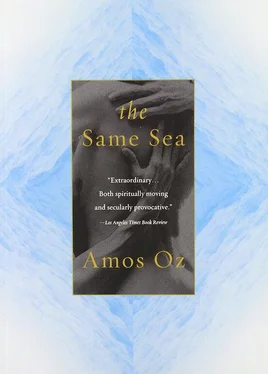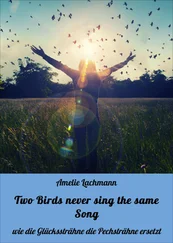Giggy Ben-Gal now makes a suggestion: What this story needs, apart from
Nirit and her hermit who lives on the edge of a village, is another twist, like
a one-night stand with an Arab farmhand, or lets say a little lesbian scene
with a neighbor. Bettine suggests finishing with the bit where Nirit and
the man are feeding the pigeons, because what comes afterward,
the traveller, the dead fox, seems too morbid to her and overly
symbolic. Dubi considers that the traveller definitely adds a deep mystical
element to the ending. As for the Narrator, he recommends deleting several
of the long silences which he regards as a bit of an affectation. Dita says
nothing. Albert hesitantly apologizes and remarks that silences can actually
sometimes express what words cannot. Meanwhile Bettine stands up, clears
away the cups and plates, and stops on her way to the kitchen to open
the curtains wide. The sight of the wintry sea which is now a virulent green
makes her think that maybe this whole argument is unnecessary. Wrapped
in the silence of empty spaces the brightly-lit earth floats from darkness to
darkness. More tea? Or some coffee? No thanks — everyone has got
things to do, promises to keep, business to see to, chores that can't be put off.
Thank you. Must say goodbye and be off. It was nice, and as for the project,
the script, it's in excellent hands. There is every reason to hope it
will enjoy enormous success. Were off to a flying start.
After that, in the car, the news. A soldier in the South Lebanon Army
has been fatally wounded and two Israelis slightly injured. In
Hazor in Galilee another small business has closed, its nine employees
are on hunger strike. A math teacher in Netanya has been
abusing his daughters for the past six years. A car went off the road
near Betar and ended up in a ravine: a father and mother and
their two sons; a daughter who survived is in a critical condition.
Epidemic and famine in Burundi. A woman in Holon has jumped.
The rain will continue. There is a warning of flooding
in low-lying areas. And a hurricane in the United States.
Who cares about Nirit's Love.
In the summer of 1946 my mother and father rented a holiday room
in the flat of a tailor in Bat Yam. One night I was woken by a
coughing sound that was not coughing, and that was the first time in my life
that I heard a grown-up stranger crying through the wall. All
the darkness long he cried, and awake and frightened I lay still not to
disturb my parents until when the darkness was weaker I crept out and
saw him on the balcony his shoulders were shaking a bird flew up in the
silence of the dawn and the man pointed to it and said to me Little boy,
don't believe. Fifty years have gone by and the bird is no longer
or the man. Or my parents. Only the sea is still there
and even it has changed from deep blue
to grey. Little boy don't believe. Or do. Believe. Who cares.
The bird wakes her. Lying on her back with her eyes shut, thinking
What's left apart from the place mat she's started and may still finish.
What's left is a wish that the pain will go away
that it will all go away and stop bending over her.
She lies as though she has left her launching pad and is now
moving along the Milky Way and already the planet
from which she was launched is far off, has shrunk till it can no longer be
distinguished from tens of thousands of other stars.
A bird on a branch calls to her and Nadia is lying
wiping away the good and the bad, like a woman who has nearly
finished washing the floor, walking backward toward the door, drawing
the mop toward her, all she has left to do is to wipe away the traces on
the wet floor of her own footprints. The pain is still sleeping: her hostile
body has not woken with her at the sound of the bird, with all its knives.
Even shame, her lifetime companion, has gone. It has ceased to gnaw at her.
Everything is letting go of her and Nadia is letting go of everything,
like a pear from a branch: the pear is not picked but a ripened pear drops.
Right now at four in the morning Nadia is the most alone she has ever been,
not alone like a sick woman hearing a bird in a garden but alone like a bird
with no garden no branch no wing. She lays her shrivelled hand on her
withered breast because suddenly for a moment the sound of the bird is
confused with a cry from a cradle at night, the baby's lips are open wide
to tickle her breast, or perhaps it is not her baby but a man covering it
with his palm, stroking it squeezing and soothing, slipping the nipple
between his lips describing with his tongue on her flesh
shivers that descend to the roots of her spine
and thus the needles of pain awake from their sleep and like
a small child in the dark she puts a finger in her mouth. Narimi narimi
has gone and now she needs an injection.
After the funeral I wrote a letter to Albert, half of it personal, which I do not
want to quote here, and the other half a kind of meditation, which I
shall reconstruct in other words. The desert and the sea, like you, insist on
balancing a joint bank account, evaporation, clouds, floods, the wind whirls
continually, rivers run into the sea, but there is no comfort in this:
from now on you are on your own without her among the heavy
brown furniture with embroidered mats lace curtains bellied for a moment by
the sea breeze which the next moment lets them hang slack. Whenever
I'm in town I'll try to drop in for a glass of tea. Try to be strong, Albert,
and phone me whenever you like. As for the assessments I sent you to check,
there's no hurry, it's not at all urgent.
The Narrator drops in for a glass of tea and Albert says to him
I read an article of yours, fire and brimstone, in yesterdays Yediot. Rico
showed it to me, he said, Read this, Dad, and don't get worked up,
just try to grasp where we are living and where all this lunacy is leading us.
That's what he said, more or less. I think he's even further to the left
than you, this repressive state and so on. I'm not so moral a person
as either of you, but I don't like the present situation much either.
Mostly I say nothing, from a deep-seated fear that in responding to
this or that wrong even I may come out with things that are not exactly
right. Anger sends out secondaries. Naturally I have every respect
for the brave child who shouts that the emperor is naked when the
crowd is cheering Long live the emperor. But the situation today is that the
crowd is yelling that the emperor is naked and maybe for that reason
the child ought to find something new to shout, or else he should
say what he has to say without shouting. As it is, there is so much
noise, even here, the whole country is full of screaming, incantations,
amulets, trumpets, fifes and drums. Or else the opposite, biting sarcasm:
everyone denouncing everyone else. Personally I'm of the opinion
that any criticism of public affairs ought to contain shall we say up to
twenty percent sarcasm, twenty percent pain, and sixty percent
clinical seriousness, otherwise everyone is mocking and jeering at each other,
Читать дальше












